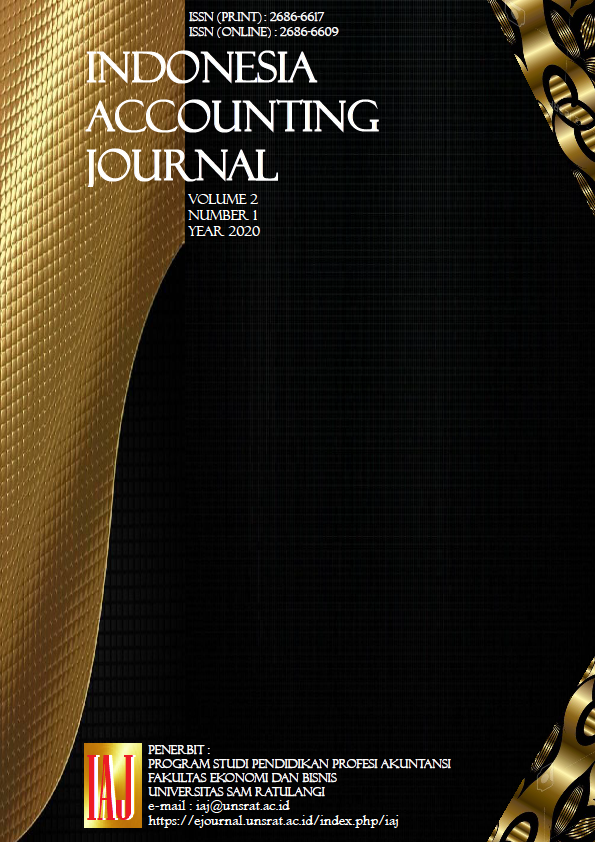Analisis penerapan standar akuntansi pemerintahan untuk belanja pada Dinas Kesehatan Kota Manado
DOI:
https://doi.org/10.32400/iaj.27605Keywords:
accrual-based government accounting standardsAbstract
Government Accounting Standards is an accounting standard established to increase transparency in the management of state finances so that the use of state finance becomes more targeted and avoids various kinds of government financial misuse. The benefits of applying accrual-based Government Accounting Standards certainly make it easier for the government to evaluate financial reports on government performance, especially on human resources. The purpose of this study was to determine for expenditure at the Manado City Health Office in accordance with the application of accrual-bassed Government Accounting Standards. The results of the study on the Manado City in Public Health Agency have carried out the implementation of Government Accounting Standards for expenditure (cost realization), and accrual-based regulations have been implemented in accordance with the regulation of the Minister of Home Affairs Number 64 of 2013.
References
Kartikahadi, H. (2016). Akuntansi keuangan berdasarkan SAK berbasis IFRS, Edisi 2 Buku 1. Jakarta: Ikatan Akuntan Indonesia.
Kema, I. (2013). Penyajian laporan keuangan daerah berdasarkan Standar Akuntansi Pemerintahan pada Pemerintah Kota Manado. Jurnal EMBA: Jurnal Riset Ekonomi, Manajemen, Bisnis dan Akuntansi, 1(3), 771-781. https://ejournal.unsrat.ac.id/index.php/emba/article/view/2215
Keputusan Presiden Republik Indonesia No. 84 Tahun 2004 tentang Komite Standar Akuntansi Pemerintahan. Jakarta.
KSAP. (2006). Memorandum pembahasan penerapan basis akrual dalam akuntansi pemerintahan di Indonesia. Jakarta. http://www.ksap.org/memorandum.pdf
Lamonisi, S. (2016). Analisis penerapan standar akuntansi berbasis akrual pada Pemerintah Kota Tomohon. Jurnal EMBA: Jurnal Riset Ekonomi, Manajemen, Bisnis dan Akuntansi, 4(1), 223-230. https://ejournal.unsrat.ac.id/index.php/emba/article/view/11592
Peraturan Pemerintah Republik Indonesia No. 18 Tahun 2016. Tentang Perangkat Daerah. Jakarta.
Peraturan Pemerintah Republik Indonesia No. 71 Tahun 2010. Tentang Standar Akuntansi Pemerintahan. Jakarta.
Peraturan Menteri Dalam Negeri No. 64. Tahun 2013. Tentang Penerapan Standar Akuntansi Pemerintahan Berbasis Akrual pada Pemerintah Daerah. Jakarta.
Pratiwi & Pamungkas. (2014). Analisis Pengakuan Pendapatan, Belanja, dan Pembiayaan Daerah pada Pemerintah Daerah Kota Bogor. Jurnal Ilmiah Akuntansi Kesatuan, 2(1), 59-72. https://www.researchgate.net/publication/325986480_Analisis_Pengakuan_Pendapatan_Belanja_Dan_Pembiayaan_Daerah_Pada_Pemerintah_Daerah_Kota_Bogor
Rintiani, N. W. (2014). Evaluasi penyajian laporan keuangan Pemerintah Daerah Kota Surabaya berdasarkan Peraturan Pemerintah No. 71 tahun 2010. Jurnal Akuntansi AKUNESA, 3(1), 1-25. https://jurnalmahasiswa.unesa.ac.id/index.php/jurnal-akuntansi/article/view/11232
Simanjuntak, B. (2010). Penerapan Akuntansi Berbasis Akrual di Sektor Pemerintahan di Indonesia. Jakarta: Kongres XI IAI. https://www.scribd.com/doc/76222442/Binsar-Paper-Kongres-Iai-9-Des-Implementasi-Akrual
Sujarweni. (2015). Akuntansi sektor publik. Yogyakarta: Pustaka Baru Press.
Supriyadi, B., Suwarda, D., & Manghayu, A. (2017). Kebijakan akuntansi akrual pemerintahan daerah. Bogor: Penerbit Ghalia Indonesia.
Tanjung, A. H. (2012). Akuntansi pemerintahan berbasis akrual pendekatan teknis sesuai PP No. 71/2010. Bandung: Alfabeta.
Undang-Undang Republik Indonesia. No. 33 Tahun 2004. Tentang Perimbangan Keuangan Antara Pemerintah Pusat dan Pemerintah Daerah. Jakarta
Downloads
Additional Files
Published
Issue
Section
License
The articles published in Indonesia Accounting Journal are licensed under Creative Commons Attribution 4.0 International License with authors as copyright holders.
Â

This work is licensed under a Creative Commons Attribution 4.0 International License.
Â
Under this license then authors free to:
- Share — copy and redistribute the material in any medium or format.
- Adapt — remix, transform, and build upon the material for any purpose, even commercially.
Under the following terms :
- Attribution — You must give appropriate credit, provide a link to the license, and indicate if changes were made. You may do so in any reasonable manner, but not in any way that suggests the licensor endorses you or your use.
- No additional restrictions — You may not apply legal terms or technological measures that legally restrict others from doing anything the license permits.
Notices:
- You do not have to comply with the license for elements of the material in the public domain or where your use is permitted by an applicable exception or limitation.
- No warranties are given. The license may not give you all of the permissions necessary for your intended use. For example, other rights such as publicity, privacy, or moral rights may limit how you use the material.


